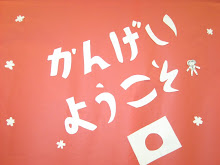Tuesday, May 4, 2010 A Block One Day
JAPANESE 3 -- First period
Review of verb groups I, II, and III.
Review of relational particle へ
Review of verb stem + に with traveling verb (to go somewhere in order to do something)
Traveling verbs: 行く、来る、かえる、出る、出かける
Comprehensive quiz on chapter 3K6 took place today.
Continuing our work on uses of the plain form (besides speaking informally with your friends) class viewed NY Times website and read article about Broadway actress who is learning Japanese to play a role in “Chicago” in Tokyo.
Homework:
1. translate pages 90 – 93 in chapter 7 (new photo story) into English
2. write one-page summary of NY Times article
Be sure to register with Japanese site on Moodle.
JAPANESE 1 – Fifth period。
Don’t forget sentence structure:
Time に Topic/subject は Destination に Traveling Verb
Time に Topic/subject は Direct Object を Active Verb
Dictation sentences:
1.うち の おとうと は じゅうどう が すき です。
2.でも ともだち の おとうと さん は スポーツ が すき で は ありません (すき じゃ ない です)。
3.ウィークエンド に うち の あね は あたらしい プール に いきました。
4.でも ケンくん の おねえさん は かいもの を しました。
5.かいもの は つまらなかった です。
After students listened to them and wrote them down and also wrote the English translation – overhead projection for self-correction.
Collected sentences about own family member compared with a friend’s family member (as written on poster). Collected summaries of NY Times article about Broadway actress who will perform in Tokyo, in Japanese, in Japanese production of “Chicago,” the musical.
Homework: flash cards for kinship terms, i.e. vocabulary for family members
Reminder:
Traveling verbs:
いきました、いって Went
きました、きて Came
はいりました、はいって Entered
かえりました Returned (home)
Family words, i.e. kinship terms:
ちち、おとうさん、おかあさん、おばあさん
New adjectives, and in the past tense!
あたらしい です。 あたらしかった です。Is new. Was new.
あつい です。 あつかった です。 Is hot. Was hot.
たのしい です。 たのしかった です。 Is enjoyable.
Was enjoyable.
Be sure to register with Japanese site on Moodle。
JAPANESE 2 Sixth Period
Three patterns:
__て も いい です か。 May I? Is it OK to?
はい、__て は いい です。Yes, it is OK to…。
いいえ、__て は だめ です。No, it is forbidden to…
Students took a comprehensive test on chapter 2K6 today.
Class went over handout about sentence stretching or extending a sentence by adding words appropriately. Collected homework, which was to translate the example sentences and then create another sequence by expanding a new sentence in similar ways.
Collected the one page summary of New York Times article: information about a Broadway actress learning her part in the musical, “Chicago,” in order to perform it with a Japanese cast in Tokyo
Started Lesson 7 in 2 Kimono – buying and selling things. Listened to manga dialogue and repeated.
Homework:
1. write dialogue in English
2. Students will have to choose own store from the following list:
はなや Flower shop 花や
本や Book store
おかしや Candy store お菓子や
やおや Grocery 八百や
にくや Butcher shop 肉や
さかなや Fish store 魚や
パンや Bakery
ぶんぼうぐや Stationery shop 文房具や
でんきや Electrical appliances 電気や
ようふくや Clothing store 洋服や
おもちゃや Toy store
ペットや Pet store
デパート Department store
きっさてん Coffee shop 喫茶店
くつや Shoe store 靴や
ゆうびんきょく Post office 郵便局
ほうせきや Jewelry 宝石屋
じどうしゃや Car dealership 自動車や
Be sure to register with Japanese site on Moodle。
Reminder: We all must be polite in the Japanese language classroom. Not only is it important in our lives in general – it is an essential part of Japanese culture. ください、おねがい します、ありがとう、すみません Are the most important words and phrases in Japanese.
JAPANESE 4 and AP – Seventh period
This class does not meet on Block One days.
About Me

- O.Kimeru
- M.A. 1992 from U. of Chicago; Japan Foundation Fellow in 1987-88; research fellow Yokohama City University; Japanese language teacher since 1991; also taught French (member American Association of Teachers of French), English as a Second Language (to students), methodology of teaching ESL (to Japanese high school teachers), English, Japanese history/culture, drama; in 2002 and 2004, listed in Who's Who Among America's Teachers; member of Chicago Sister Cities Osaka Committee, and chair of its Education Sub-Committee; vice-president Illinois Association of Teachers of Japanese; Payton H.S. World Language Department Chair from 2003-2007, under founding principal Mrs. Gail Ward; taught Japanese and coordinated Japan Exchange at Payton from 2003 to 2010; Japanese teacher at Burr Public School beginning August, 2010
Followers
Blog Archive
-
▼
2010
(88)
-
▼
May
(20)
- Japanese 2 June Review (work in progress)
- Japanese 1 June Review (work in progress)
- Japanese 3: June Review (work in progress)
- May 28, 2010 An Eight Period Day
- May 27, 2010 Seminar Day
- May 26, 2010 A Block Two Day
- May 25, 2010 A Block One Day
- May 24, 2010 An Eight Period Day
- May 21, 2010 An Eight Period Day
- May 19, 2010 A Block Two Day
- May 18, 2010 A Block One Day
- May 17, 2010 An Eight Period Day
- May 13, 2010 An Eight Perio...
- May 12, 2010 A Block Two Day
- May 11, 2010 A Block One Day
- May 10, 2010 An Eight Period Day
- May 7, 2010 An Eight Period Day
- May 5, 2010 A Block Two Day
- May 4, 2010 A Block One day
- May 3, 2010 An Eight Period Day
-
▼
May
(20)